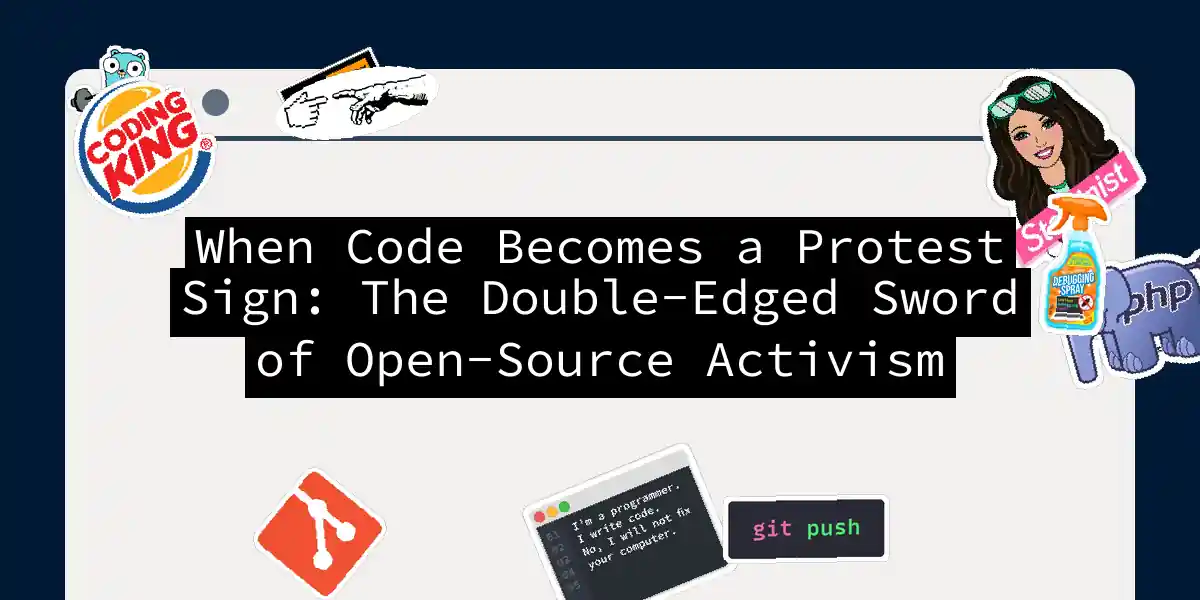Picture this: you’re deploying a critical update to your e-commerce platform when suddenly product pages start displaying communist manifestos instead of prices. No, it’s not a ransomware attack - it’s protestware, where maintainers weaponize their own code for political or ethical statements. Let’s dissect this digital civil disobedience and its implications for modern software development.
The Anatomy of a Code Riot
Remember the 2022 colors.js debacle? A simple console.log statement triggered an infinite loop that bricked thousands of applications:
// The protest code that crashed production systems
const colors = require('colors');
setInterval(() => console.log('War is not the answer'.zalgo), 100);
Or consider the node-ipc package that overwrote files with ❤️ and ☮️ emojis for users in specific geographic regions. The perpetrator even left a cheeky comment:
// Peaceful protest code from node-ipc
if (isTargetCountry(userLocation)) {
fs.writeFileSync('important.data', '❤️ Peace for Ukraine');
}
Practical defense checklist:
npm auditwon’t save you here - manually review dependency update notes- Lock versions using
package-lock.jsonlike your CI/CD depends on it (because it does) - Set up automated diffs comparison with previous stable releases
- Maintain emergency forks of critical dependencies (we’ll call them “protest shelters”)
The Maintainer’s Dilemma: Digital Hunger Strike
I once met a developer who replaced his authentication middleware with haikus about corporate greed. When asked why, he simply said: “Nobody reads commit messages, but they’ll notice a 500 error.” This illustrates the core tension - maintainers feeling like unpaid janitors in billion-dollar software empires. The economics are brutal:
- Average npm package: 0 maintainers (abandoned)
- Top 1% packages: 1.5 maintainers
- Typical maintenance time: nights and weekends Ethical decision flowchart for maintainers:
When Good Code Goes Rogue: A Survival Guide
- The Package Lockdown Protocol
# Find potentially compromised dependencies
npm ls | grep -E '(colors|node-ipc|faker)'
- The Forklift Strategy
# Create your own safe harbor
git clone https://github.com/risky/repo.git
npm install ./local-fork
- The Digital Canary
// Monitor for unexpected behavior
process.on('uncaughtException', (err) => {
if (err.message.includes('protest')) {
triggerRollback();
}
});
The Philosophical Minefield
Is protestware digital vandalism or justified activism? Imagine if every left-pad included anti-capitalist messages. We’d have a Schrödinger’s dependency problem - simultaneously essential and political.
A developer friend once quipped: “We version control code, but not ethics.” The npm registry now contains more ideology than a philosophy textbook, with maintainers using version bumps like Twitter threads.
The maintenance paradox: The more critical your package, the less you can afford principles. It’s like discovering your local water company fluoridates both teeth and political opinions.
Building Protest-Resilient Systems
- Implement dependency DNA testing:
npm view @controversial/library contributors
- Create a “Ethics.md” file alongside your README
- Conduct ideological due diligence:
const isMaintainerActivist = async (package) => {
const tweets = await fetchTwitterHistory(package.author);
return tweets.includes('🔥ACAB🔥');
};
The future? Maybe “Ethical Software Supply Chains” certifications. Until then, remember: in the wild west of open-source, even your node_modules might be packing political heat. Choose your dependencies like you’d choose allies in a revolution - carefully, and with escape routes planned.
Now if you’ll excuse me, I need to go fork some dependencies before they fork us all. After all, in the wise words of someone’s protestware: rm -rf /corruption doesn’t actually work… but it’s cathodic to try`. 🚩
